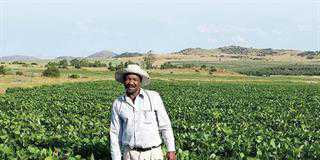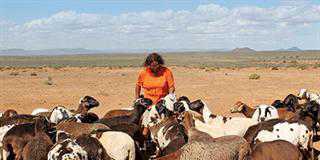‘Farming is not for sissies’, says emerging commercial farmer André Thops of Olyfkloof farm in the Hex River Valley. He sites the lack of cash flow and access to funds as the key restraining factors experienced by emerging farmers. To counter these factors he diversifies his wine grape, olive and broiler chicken operations with cash crops. Glenneis Erasmus reports.
André thops (46) of Olyfkloof farm in the Hex River Valley has become known as one of the Western Cape’s most successful emerging commercial farmers. As a youngster, André and one of his friends used to visit a farm where his friend’s family worked. André, however, never imagined that it would be possible for him to become a farmer and therefore pursued a teaching career after finishing high school.
However, in 1995 his agricultural career started as a seasonal worker on Boetie Auret’s table grape farm in the Hex River Valley during his pupils’ school holidays. His life took a new course when Auret offered him a full-time job in 1996. André worked for Auret until 2001 and then began working for Fanie Swarts. The move was motivated by his desire to be exposed to different farming practices and management styles.
“I wanted to be exposed to different production environments and farm management styles so that I could take the best of these worlds and adapt them to form my own farm management style,” he says.
At that time he also completed a part-time table grape production course at the Elsenburg Agricultural College just outside Stellenbosch. The idea of owning a farm also started to take root, but this dream remained financially inaccessible. “Buying a farm at that stage would have resulted in too much debt and this would have rendered a farm financially non-viable,” André recalls.
“I also didn’t want to buy a farm with a group of people. I have a strong entrepreneurial spirit – a group would have held me back.”
Starting with one tunnel
Instead of purchasing a farm he bought a tunnel to produce mission, manzanilla, frantoio, leccino and calamata olive cuttings. Over 500 trees were produced and sold during the first year (2004), but he lost over 10 000 cuttings in the second season. This setback didn’t stop him and he produced and sold over 8 000 cuttings in 2006. His cuttings are in such high demand that they are all sold out for 2007.
André finally managed to buy the farm Olyfkloof at the end of 2004 with money generated from his pension fund, the olive cuttings and Land Redistribution for Agricultural Development (LRAD) funds and loans. Johan Malan, the farmer from whom he bought the farm, was extremely accommodating. “Malan allowed me to start farming before I received the LRAD funds for which I had to wait over two years,” André says.
Olyfkloof consists of 42ha, of which 30ha are suitable for agricultural production. The land was previously used for pig production, but laid waste for a few years before André took over.
He decided to rather plant wine grapes than table grapes. “I cannot afford extra labour and have to do all the farm work myself,” André says. “In addition I am still working full-time for Swarts on three other farms. Table grapes require a large amount of pruning and careful picking for high-quality grape production. As a result it’s more labour intensive than wine grape production.”
André planted 1ha to columbar vines during a three-day holiday in September last year as this cultivar generates the highest financial returns in the Hex River Valley. It’s also in high demand at one of the local cellars giving him access to a viable market.
An olive orchard of 6ha was planted in August last year. Triticale was planted between the olive trees as mulch. “Our soils are extremely sandy and the triticale helps to prevent sand from blowing onto the olive cuttings. Triticale also has numerous other advantages: it improves soil aeration, enhances the carbon content of the soil and as mulch helps to keep the soil cool and reduces water evaporation,” André says.
Lack of cash flow and access to funds are the key restraining factors experienced by emerging farmers, according to André. It can take up to four years for vineyards and orchards to become commercially productive, but they will still require continual inputs in the form of nutrition and maintenance. This can be extremely draining on a farming enterprise, especially when production is started from scratch.
“Many new farmers underestimate the time and costs it takes for production to become financially viable and they also don’t have access to emergency funds if something breaks that needs to be repaired as soon as possible. This is one of the main reasons why farms go bankrupt,” he says. André has addressed this problem by diversifying production with cash crops.
First he established 1,5ha of pumpkins and butternuts. These crops receive nitrogen, phosphorous and potassium two weeks after planting and again two weeks later. Plants also receive boron and molybdenum during flowering to enhance fruit set. The long shelf lives of pumpkins and butternuts is an advantage as it provides a large marketing window for these fresh produce. André won’t, for example, sell butternuts in February, but will wait for the market to improve and rather sell them in August when he foresees prices to be higher for this commodity.
He plans to expand his vegetable production to incorporate beetroot, beans and cabbage on an additional 10ha of land. The borehole water on the farm is quite brackish and is only used on plants that are relatively salt-resistant, such as the olive trees and beetroot, while the water from the irrigation board is used on less hardened crops such as the vineyards.
Jojoba oil production is one of his most recent endeavours. His market investigation revealed that he could make around R30 per ten millilitres of jojoba oil and he already has a market contact in France. He planted 2ha of jojoba in 2006 and these plants are expected to generate commercial yields in two years’ time.
The soil is extremely rocky and it costs about R18 000 per hectare to clean land for the olive orchards, vineyards and cash crops. André has found a market opportunity for chicken and has decided to establish a broiler with a capacity to produce 10 000 to 15 000 chickens on 2ha of land where it would be too expensive to remove the rocks for plant production.
He ascribes his farming success to hard work and taking calculated risks. “Farming is not for sissies. A farmer needs to work from early in the morning and often can’t take holidays when most other people are able to do so,” he says. “If you cannot live with this, then you are not meant to be a farmer.” André knows he may be considered crazy for risking his pension, house and savings to realise this dream. “But if you never try then you will never know if it would have worked.”
Contact André Thops on 084 364 1439. |fw












